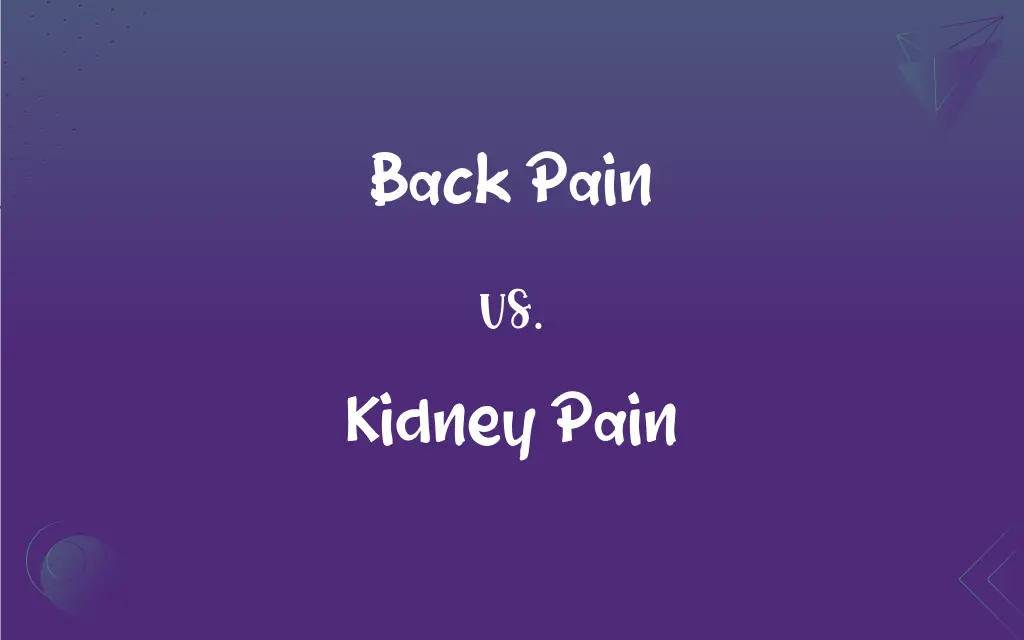Back Pain vs. Kidney Pain: What's the Difference?
Edited by Aimie Carlson || By Harlon Moss || Updated on October 7, 2023
Back pain typically originates from the muscles, nerves, or other structures in the spine, whereas kidney pain usually occurs in the flanks or lower back and is often deep, beneath the ribs, but sometimes also felt in the front of the torso.

Key Differences
Back pain is a common ailment affecting the structures of the spine, including muscles, ligaments, and joints. It can range from a dull, constant ache to a sudden, sharp sensation, and may arise due to improper posture, muscle strain, or structural issues in the spine. Kidney pain, contrarily, often derives from issues related to the kidneys, such as infections or stones, and may produce a sharp, intense pain, generally located under the ribs, with possible radiating to the groin.
Back pain, being diverse in origin, can be classified into acute, subacute, or chronic, based on duration. It can stem from numerous causes including muscular strain, disc degeneration, injuries, or even psychological stress. Kidney pain, on the other hand, tends to be acute and is often related to urinary tract issues, infections, or kidney stones, providing a stark pain that often necessitates immediate attention and usually presents alongside other symptoms like fever or urinary changes.
Understanding back pain involves recognizing its wide-ranging sources and manifestations. It can be localized or radiate to other areas, and may be accompanied by other symptoms like numbness or tingling, depending on the affected nerves. Kidney pain, contrastingly, is typically quite localized and may fluctuate in intensity, possibly increasing in severity, or coming in waves, and is often correlated with other renal symptoms.
Addressing back pain typically involves analyzing posture, physical activities, and ergonomic environments, implementing changes or therapies accordingly. In contrast, kidney pain often requires medical intervention to address underlying issues such as infection or obstructions, with treatments diverging substantially from those of back pain.
Comparison Chart
Typical Location
Can be upper, middle, or lower back
Often in the flanks beneath the ribs
ADVERTISEMENT
Nature of Pain
Can be dull, aching, or sharp
Often acute and sharp
Associated Symptoms
Possibly numbness, tingling
Often fever, urinary changes
Common Causes
Muscle strain, disc issues, posture
Kidney stones, infections
Management Strategies
Physical therapy, posture correction
Often involves treating underlying kidney issues
Back Pain and Kidney Pain Definitions
Back Pain
Pain originating from nerve irritation or damage.
Sciatica often causes intense back pain along the sciatic nerve.
ADVERTISEMENT
Kidney Pain
Pain associated with polycystic kidney disease.
Multiple cysts on his kidneys were the source of his persistent kidney pain.
Back Pain
Pain due to maintaining a certain posture for prolonged periods.
Sitting at a desk all day led to persistent back pain.
Kidney Pain
Pain due to the presence of kidney stones.
The sharp, cramping kidney pain was attributed to a sizable stone.
Back Pain
Persistent pain that lasts for 12 weeks or longer.
Despite therapy, her back pain, lingering for months, was categorized as chronic.
Kidney Pain
Pain following physical injury to the kidney.
After the car accident, he experienced significant kidney pain due to trauma.
Back Pain
Back pain stemming from muscle strains or spasms.
After lifting heavy boxes, she experienced back pain.
Kidney Pain
Pain arising from kidney infections.
She was rushed to the hospital for kidney pain caused by a severe infection.
Back Pain
Pain related to structural aspects of the spine.
His back pain was due to a herniated disc.
Kidney Pain
Pain resulting from blockage of urine flow.
An obstructed ureter caused unbearable kidney pain.
FAQs
Is all pain in the lower back indicative of kidney pain?
No, numerous conditions like muscle strain, sciatica, or spinal issues can also cause lower back pain.
Can improper lifting techniques lead to back pain?
Yes, improper lifting can strain muscles and ligaments in the back, causing pain.
Is it possible to prevent back pain?
Yes, through measures like maintaining good posture, exercising regularly, and ensuring ergonomic workspaces.
Is kidney pain always a medical emergency?
Not always, but acute, severe, or persistent kidney pain should be evaluated by a healthcare professional promptly.
What is the primary distinction between back pain and kidney pain?
Back pain generally relates to muscular or skeletal issues, while kidney pain is usually linked to problems with the kidneys themselves, like infection or stones.
Who should address kidney pain?
A nephrologist or urologist typically addresses kidney pain.
Can one experience kidney pain without other symptoms?
It's possible, but kidney pain is often accompanied by other symptoms like urinary changes or fever.
What immediate actions should be taken for sudden kidney pain?
Sudden, severe kidney pain warrants immediate medical attention to diagnose and address the underlying cause.
Are kidney stones the only cause of kidney pain?
No, kidney pain can also be caused by infections, trauma, or other kidney-related issues.
Can stress cause back pain?
Yes, stress can cause muscle tension, leading to pain and discomfort in the back.
Is persistent back pain a sign of spinal issues?
Persistent back pain might indicate spinal issues and warrants medical evaluation.
Can back pain be a symptom of kidney issues?
Yes, sometimes back pain, especially located towards the flanks, might be indicative of kidney issues.
How can one differentiate between muscular back pain and kidney pain?
Kidney pain is often sharper, deeper, and located under the ribs, while muscular pain might be diffuse and affected by movement or touch.
What kind of doctor treats back pain?
Orthopedic doctors, neurologists, or pain specialists might treat back pain, depending on the cause.
Can kidney pain be a sign of chronic kidney disease?
Yes, in some cases, persistent or recurrent kidney pain may indicate an underlying chronic condition.
Can kidney pain be confused with other types of abdominal pain?
Yes, kidney pain can sometimes be mistaken for other abdominal issues due to its location and nature.
How is kidney pain diagnosed?
Through physical examination, patient history, urine tests, and potentially imaging tests like ultrasounds or CT scans.
Can exercise alleviate back pain?
Yes, certain exercises, if done correctly, can alleviate back pain by strengthening supporting muscles.
Can lifestyle and diet impact both back pain and kidney pain?
Yes, proper posture and ergonomics can prevent back pain, while hydration and a balanced diet can help in preventing kidney issues causing pain.
How is back pain diagnosed?
Through physical examination, patient history, and potentially imaging tests like X-rays or MRIs.
About Author
Written by
Harlon MossHarlon is a seasoned quality moderator and accomplished content writer for Difference Wiki. An alumnus of the prestigious University of California, he earned his degree in Computer Science. Leveraging his academic background, Harlon brings a meticulous and informed perspective to his work, ensuring content accuracy and excellence.
Edited by
Aimie CarlsonAimie Carlson, holding a master's degree in English literature, is a fervent English language enthusiast. She lends her writing talents to Difference Wiki, a prominent website that specializes in comparisons, offering readers insightful analyses that both captivate and inform.































































